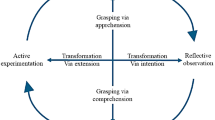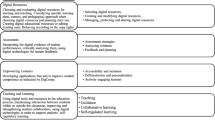Abstract
This paper examines the influence of blended pedagogy in facilitating the development of digital competences among teacher trainees in a leading University in Uganda. This is an action research that took place between August and November, 2019, in which data were collected from third-year teacher trainees at School of Education in a pre- and post-intervention survey environment. At the beginning of August 2019, a self-administered questionnaire (SAQ) seeking the opinions about the teacher trainees’ digital competences was administered. In the course of the semester, the researchers introduced a blended pedagogy approach through offering online tutorials to the teacher trainees using a MOODLE learning management system referred to as Makerere University Electronic Learning Environment (MUELE) in the course unit known as Evaluation of Instruction. Prior to the beginning of semester one examinations in November 2019, the same SAQ was administered to teacher trainees to examine the influence of blending online tutorials in nurturing their digital competences. Findings indicate improved competences in teacher trainees’ digital competences in line with navigation in the internet environment, operating mobile internet, operating internet-based search engines, and formal internet skills. Other competences that teacher trainees demonstrated improvement include digital information and communication competences. The study, however, indicated minimal improvement in teacher trainees’ digital competences in content creation. Consequently, it is recommended that teacher educators should deliberately adopt the use of blended pedagogy to enable teacher trainees develop the various digital competences expected from the twenty-first-century teacher.

Similar content being viewed by others
Availability of data and materials
The datasets used and/or analyzed during the current study are available from the corresponding author on reasonable request.
Reference
Aborisade AP (2013) Blended learning in English for Academic Purposes courses: A Nigerian case study. In Blended Learning in English Language Teaching: Course Design and Implementation Edited by Tomlinson, B. and Whittaker, C. London: British Council. Retrieved June 18, 2020 from https://www.teachingenglish.org.uk/sites/teacheng/files/pub_D057_Blended%20learning_FINAL_WEB%20ONLY_v2.pdf.
Basheka B, Lubega TJ, Baguma R (2016). Blended-learning approaches and the teaching of monitoring and evaluation programmes in African universities: Unmasking the UTAMU approach. African Journal of Public Affairs. Volume 9 number 4 December 2016. Retrieved June 18, 2020 from https://utamu.ac.ug/docs/research/publications/journals/Blended-learning%20approaches%20and%20the%20teaching%20of%20monitoring%20and%20evaluation%20programmes%20in%20African%20universities.pdf.
Buluma A, Ezati AB, Najjuma R (2018) Role of teacher education pedagogy in developing communication competences among teacher trainees. A Case of Makerere University –Uganda. International Journal of Excellence Innovation and Development Volume 1, Issue 1, Nov. 2018 Page No. 038 - 045.
Crawford R, Jenkins LE (2018) Making Pedagogy Tangible: developing skills and knowledge using a team teaching and blended learning approach. Aust J Teach Educ. https://doi.org/10.14221/ajte.2018v43n1.8
Engeström Y (1999) Innovative learning in work teams: analysing cycles of knowledge creation in practice. In: Engeström Y et al (eds) Perspectives on activity theory. Cambridge University Press, Cambridge, pp 377–406
Eydelman N (2013) A blended English as a Foreign Language academic writing course. In Blended Learning in English Language Teaching: Course Design and Implementation Edited by Tomlinson, B. and Whittaker, C. London: British Council. Accessed 18 June 2020 from https://www.teachingenglish.org.uk/sites/teacheng/files/pub_D057_Blended%20learning_FINAL_WEB%20ONLY_v2.pdf.
Kagoda AM, Sentongo J (2015) Practicing teachers ‟Perceptions of teacher trainees: implications for teacher education. Horizon Research Publishing. https://files.eric.ed.gov/fulltext/EJ1056076.pdf.
Kihoza DP (2016) A framework for online resources and e-learning implementation (Orei) in Tanzania Secondary Schools. A Dissertation Submitted in Partial Fulfilment of the Requirements for the Degree of Doctor of Philosophy in Information and Communication Science and Engineering of the Nelson Mandela African Institution of Science and Technology. Retrieved June 18, 2020 from http://scholar.mzumbe.ac.tz/bitstream/handle/11192/2037/Patrick%20Daniel%20Kihoza%20dissertation.pdf?sequence=1.
Kilfoil WR (ed) (2015) Moving beyond the hype: a contextualised view of learning with technology in higher education. Universities South Africa, Pretoria
Kofi BW (2014) Impact of emerging technologies on teacher education: experiences of teacher-trainees. J Educ Pract. ISSN 2222–1735 (Paper) ISSN 2222–288X (Online). Vol.5, No.28, 2014.
Machado PSM, Sepúlveda TCG, Montoya RSM (2016) Educational innovation and digital competencies: the case of OER in a private Venezuelan university. Int J Educ Technol Higher Educ 13:10
McGuinness C, Fulton C (2019) Digital literacy in higher education: A case study of student engagement with e-tutorials using blended learning. J Inf Technol Educ Innov Pract 18:1–28
Muyinda P, Aguti N, Bainomugisha A, Kihiigi E, Mugabi P (2020) Fast tracking the implementation of elearning/blended learning at Makerere University. A preliminary proposal of the Adhoc Committee.
Nambi R (2018) Using Activity Theory to Explore the Possibilities of Integrating ICT in the Training of Literature in English teachers at Makerere University: a literature review. Int Learn Teach Educ Res 17(12):135–148
Ogwu N (2016) Comparative analysis of teacher trainee students’ e-learning technology (ELT) readiness towards promoting global curriculum best practice. Educ Res Rev 11(17):1679–1688
Pedersen L (2015) Blended learning design: the potentials and pitfalls designing blended learning courses in a professional bachelor context. Accessed 17 June 2020 from https://www.ucviden.dk/portal/da/publications/blended-learning-design(9fef4a87-9c4e-4220-bdb2-8c18db26e65b).html.
Røkenes MF, Krumsvik JR (2014) Development of student teachers’ digital competence in teacher education: a literature review. Nordic J Digit Literacy 9(4–2014 s): 250–280
State of Victoria (Department of Education and Early Childhood Development) (2012) Blended learning: a synthesis of research findings in Victorian education 2006–2011. Melbourne: Ultra net and Digital Learning Branch Department of Education and Early Childhood Development. Acessed 17 June 2020 https://www.education.vic.gov.au/Documents/about/research/blendedlearning.pdf.
Van Deursen AJAM, Helsper EJ, Eynon R (2014) Measuring digital skills. From digital skills to tangible outcomes project report. www.oii.ox.ac.uk/research/projects/?id=112.
Acknowledgements
The authors acknowledge all the 2019/2020 teacher trainees from School of Education, Makerere University, who consented to participate in this study. In addition, the researchers are grateful to the system administrators Ms. Rukia Nakintu and Mr. Egesa Godfrey for the endless effort in guiding teacher trainees on how to access and utilize MUELE.
Funding
No funding was received.
Author information
Authors and Affiliations
Corresponding author
Rights and permissions
About this article
Cite this article
Buluma, A., Walimbwa, M. Blended learning pedagogy and the development of digital competences among teacher trainees in a predominantly face-to-face teacher education program. SN Soc Sci 1, 87 (2021). https://doi.org/10.1007/s43545-021-00090-0
Received:
Accepted:
Published:
DOI: https://doi.org/10.1007/s43545-021-00090-0




